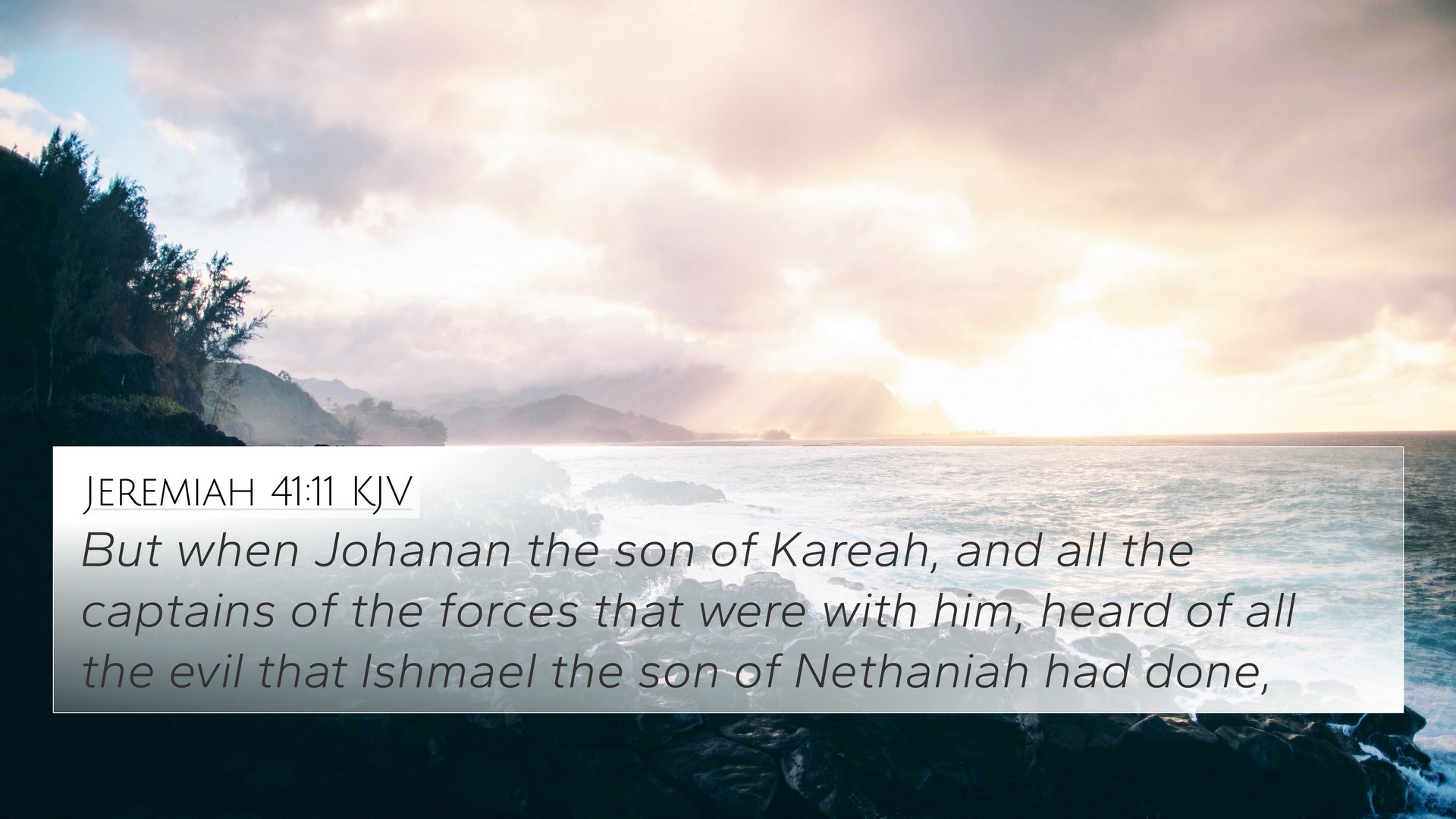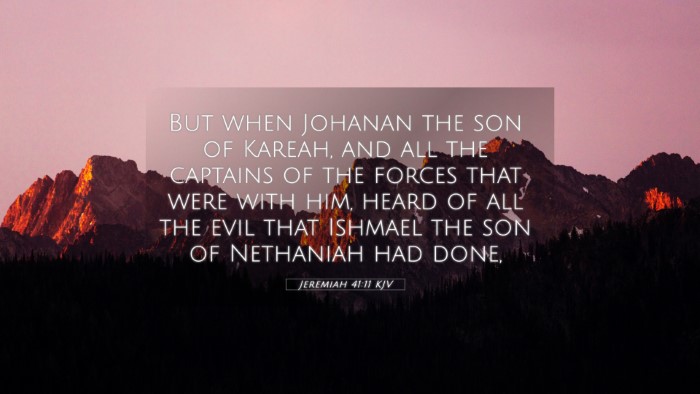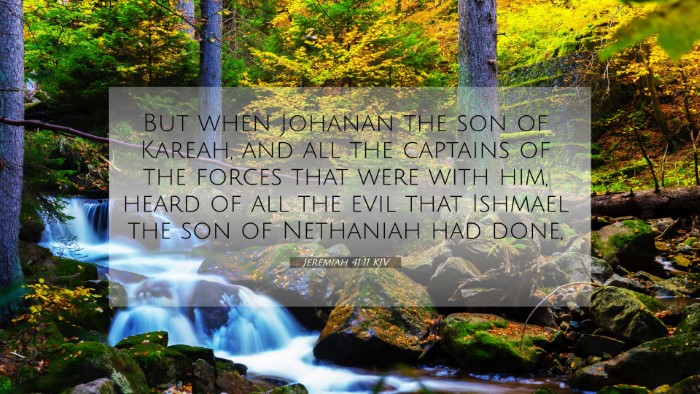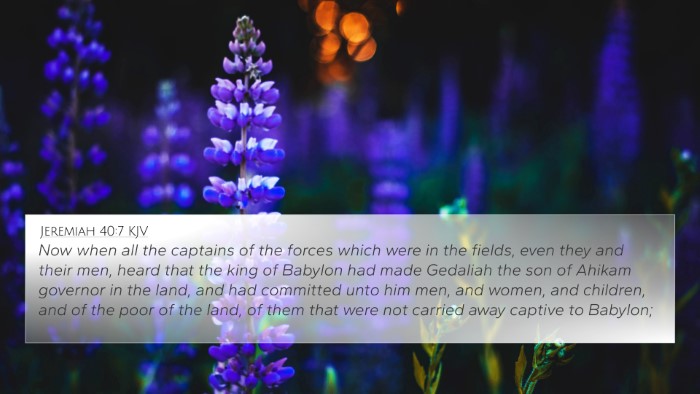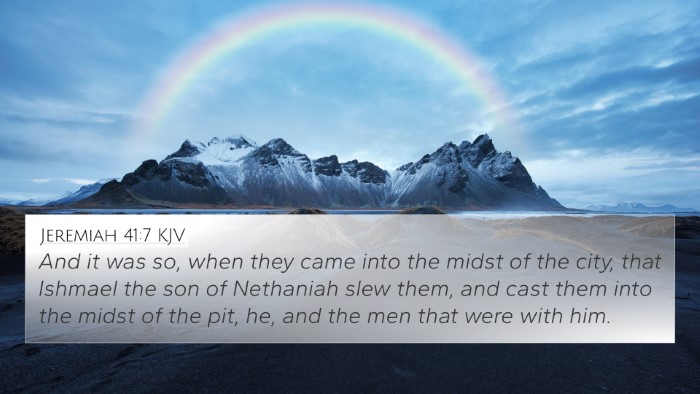Understanding Jeremiah 41:11
Jeremiah 41:11 states: "But Johanan the son of Kareah, and all the captains of the forces that were with him, heard of all the evil that Ishmael the son of Nethaniah had done." This verse marks a significant turning point in the narrative, illustrating human responses to calamity and the effects of leadership.
Verse Meaning and Context
The verse occurs during a tumultuous period for the people of Judah following the destruction of Jerusalem. Ishmael’s actions reflect the chaos and fragmented leadership during this time. Johanan represents a contrasting response, signaling hope and action amidst despair.
Insights from Commentaries
-
Matthew Henry:
Henry emphasizes the perilous situation of the remnant of Israel. Johanan and his men’s reaction to Ishmael’s deeds underscores their leadership and willingness to address wrongdoing swiftly, suggesting the critical role of righteous leadership in maintaining order during chaos.
-
Albert Barnes:
Barnes points out that Johanan is seen as a figure of resistance against the evil perpetrated by Ishmael. This indicates a division among the people—the loyalty to rightful leadership contrasted with the treachery that arises in times of national calamity.
-
Adam Clarke:
Clarke discusses the implications of fear and action. The gathering of Johanan and his captains in response to Ishmael’s atrocities illustrates the human instinct to rally against violence and seek protection for the vulnerable—a recurring theme in the Bible.
Cross-References for Jeremiah 41:11
This verse finds connections with numerous other biblical passages that shed light on its meaning and implications:
- Jeremiah 40:13-16: Context regarding Johanan’s character and previous efforts to lead the people.
- Jeremiah 41:1-4: Further details about Ishmael’s violent actions which prompt Johanan's response.
- Jeremiah 42:1-6: The request for guidance from the Lord during a time of distress, illustrating the people's search for direction.
- Genesis 37:18-20: Similarities in betrayal and violence, showing how treachery is a recurrent theme in biblical narratives.
- 1 Samuel 26:19: The importance of leadership in protecting communities, linking the behavior of figures like Johanan to earlier biblical leaders.
- Isaiah 5:20: Woe to those who call evil good, emphasizing the moral clarity that Johanan seeks to uphold against Ishmael’s actions.
- Proverbs 28:15: A wicked ruler can wreak havoc, suggesting the significance of righteous leadership in safeguarding the community.
- Matthew 24:10-12: Resonance with the end times, where betrayal among community members parallels Ishmael and Johanan's scenario.
- Luke 11:17: A kingdom divided against itself cannot stand; emphasizes the need for unity against disruptive evil.
- Acts 15:24: Illustrates response to false teachings and protectiveness of the church against unsound influence, akin to Johanan’s actions.
Thematic Connections
This verse and its surrounding context can serve as a lens for exploring broader biblical themes:
- Leadership vs. Anarchy: Reflects on how the lack of strong, moral leadership can lead to chaos, contrasting effective and ineffective rulers.
- Justice and Retribution: The actions of Ishmael evoke a need for divine justice and human intervention against wrongdoing.
- Hope in Despair: Johanan’s leadership offers a glimpse of hope amidst widespread fear and violence, echoing the overarching narrative of resilience in the Bible.
Learning from Jeremiah 41:11
For those studying this passage, applying its lessons through cross-referencing and thematic exploration can deepen understanding of biblical principles:
- Using Bible Cross-Reference Tools: Utilize concordances and cross-reference guides to discover related scriptures that enhance interpretation.
- Engaging in Comparative Bible Studies: Analyze the responses of different biblical characters to similar situations, developing insights into righteous behavior.
- Exploring Inter-Biblical Dialogue: Investigate thematic connections across both the Old and New Testaments, assessing how various texts converse with each other.
- Preparing for Sermons: Gather cross-references that bolster the message you wish to convey, focusing on the importance of wisdom in leadership.
Conclusion
Jeremiah 41:11 is a poignant reminder of the roles individuals can play in times of crisis. By understanding its meaning through the lens of public domain commentaries and engaging with other related scriptures, believers can extract valuable lessons about leadership, moral responsibility, and the importance of community in addressing evil.
